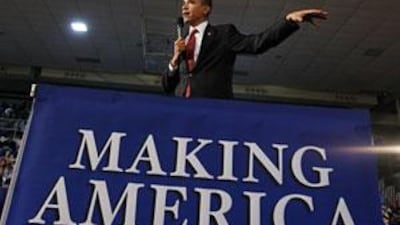WASHINGTON // Barack Obama has pledged to spend wisely the billions of dollars announced this week as part of a stimulus package, but observers are warning it will be an uphill struggle to protect against waste and fraud.
In the last two examples of where the US poured billions into infrastructures projects - Iraq and the southern US states after Hurricane Katrina - a lack of oversight allowed for corruption and overspending. Investigations in Iraq have led to at least 35 convictions for corruption so far, and The New York Times reported this week that investigators are now targeting more senior military officials in connection with fraud and bribery.
In the wake of Katrina, government auditors found that thousands of people took advantage of government aid, many of them fabricating damaged houses to get a US$150,000 (Dh552,000) homeowner's grant to rebuild. One government programme alone lost more than a billion dollars to fraudulent or improper payments. Steve Ellis, the vice president of Taxpayers for Common Sense, a watchdog group in Washington, DC, warned that the $787 billion bailout had the potential for similar exploitation. "In all three places, we're throwing a lot of cash out in a very short period of time," he said.
"There are certainly analogies and lessons to be learned." Even in the best case scenario "there will be billions of dollars wasted in this stimulus". "You're throwing a lot of money out on the street, and inevitably, people are going to try to take advantage of that," he said. Mr Obama on Tuesday promised "new standards of transparency and accountability" in the massive government spending he hopes will rekindle growth in the economy.
"My administration will initiate new, far-reaching measures to help ensure that every dollar spent in this historic legislation is spent wisely and for its intended purpose," he said. Backing up those lofty ambitions, Mr Obama has included more than $80 million in the legislation for a board that will oversee the spending and millions more for the inspectors general of the various federal agencies that will be involved.
Funding for an inspector general "was something that was very slow to gain political support in the Iraq reconstruction", Mr Ellis said. "I think that was definitely a case where a lesson was learned and then applied here." Congress created the office of the Special Inspector General for Iraq Reconstruction (SIGIR) in 2004 to oversee spending in the $125bn rebuilding effort. Danny Kopp, a spokesman for the office, noted that SIGIR's model of oversight is also being used for spending in Afghanistan and for the Troubled Asset Relief Program, or TARP, the recent legislation to aid ailing banks.
"They seem to be in vogue today, setting up these inspector generals," Mr Kopp said, adding that his office has been seen as effective in Iraq. "Certainly the laissez faire mode of doing things towards the beginning of this campaign doesn't exist today." The Obama administration on Tuesday also launched a new website, Recovery.gov, to provide information about where the federal stimulus money is going so that citizens can "hold government accountable".
But Brian Darling of The Heritage Foundation, a conservative think tank, believes the oversight will not be enough and the administration is relying too heavily on the website. "It may be a transparent process, but you're basically ceding oversight to reporters and the media and the American people," Mr Darling said. SIGIR's Mr Kopp said the recent wave of public frustration over white-collar corruption and greed has actually helped the effort to find and root out fraud in Iraq spending.
"I think the public being more aware of these issues has pressed Congress to seek results more sternly," he said. The inspector presented to Congress earlier this month findings from a new SIGIR report called Hard Lessons: The Iraq Reconstruction Experience, which outlines some of the more brazen instances of corruption and waste in Iraq over the last six years. "We've produced report after report where we delineate very clearly where things have gone wrong, and they go unattended to," Mr Kopp said.
"There are a lot more eyes on this issue now. Hopefully with more public attention on these things people will be watching." Mr Obama has boasted that the new stimulus bill includes no "earmarks" - pet projects that US lawmakers fund by attaching specific wording to often unrelated legislation. Mr Ellis noted that while his group stridently opposes earmarks and has been a leader in exposing their abuse, there is also a downside to throwing around "buckets of cash with very little specificity or guidelines".
"We may end up spending a lot of money and not getting a lot in return," he said. * The National

